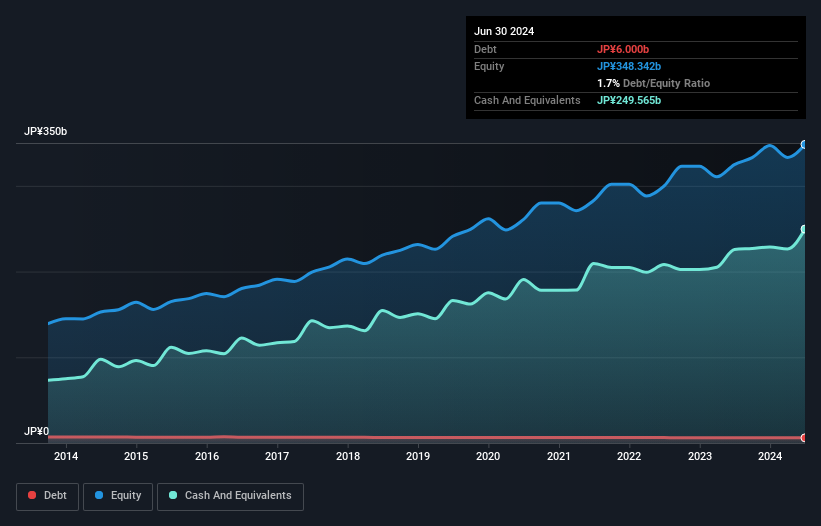
Legendary fund manager Li Lu (who Charlie Munger backed) once said, 'The biggest investment risk is not the volatility of prices, but whether you will suffer a permanent loss of capital.' So it might be obvious that you need to consider debt, when you think about how risky any given stock is, because too much debt can sink a company. We note that Otsuka Corporation (TSE:4768) does have debt on its balance sheet. But is this debt a concern to shareholders?
Why Does Debt Bring Risk?
Debt assists a business until the business has trouble paying it off, either with new capital or with free cash flow. Ultimately, if the company can't fulfill its legal obligations to repay debt, shareholders could walk away with nothing. However, a more usual (but still expensive) situation is where a company must dilute shareholders at a cheap share price simply to get debt under control. By replacing dilution, though, debt can be an extremely good tool for businesses that need capital to invest in growth at high rates of return. When we examine debt levels, we first consider both cash and debt levels, together.
Check out our latest analysis for Otsuka
How Much Debt Does Otsuka Carry?
As you can see below, Otsuka had JP¥6.00b of debt, at June 2024, which is about the same as the year before. You can click the chart for greater detail. But it also has JP¥249.6b in cash to offset that, meaning it has JP¥243.6b net cash.

How Healthy Is Otsuka's Balance Sheet?
We can see from the most recent balance sheet that Otsuka had liabilities of JP¥263.0b falling due within a year, and liabilities of JP¥12.6b due beyond that. On the other hand, it had cash of JP¥249.6b and JP¥185.0b worth of receivables due within a year. So it can boast JP¥159.1b more liquid assets than total liabilities.
This short term liquidity is a sign that Otsuka could probably pay off its debt with ease, as its balance sheet is far from stretched. Simply put, the fact that Otsuka has more cash than debt is arguably a good indication that it can manage its debt safely.
Fortunately, Otsuka grew its EBIT by 7.2% in the last year, making that debt load look even more manageable. There's no doubt that we learn most about debt from the balance sheet. But ultimately the future profitability of the business will decide if Otsuka can strengthen its balance sheet over time. So if you're focused on the future you can check out this free report showing analyst profit forecasts.
Finally, while the tax-man may adore accounting profits, lenders only accept cold hard cash. Otsuka may have net cash on the balance sheet, but it is still interesting to look at how well the business converts its earnings before interest and tax (EBIT) to free cash flow, because that will influence both its need for, and its capacity to manage debt. During the last three years, Otsuka produced sturdy free cash flow equating to 70% of its EBIT, about what we'd expect. This free cash flow puts the company in a good position to pay down debt, when appropriate.
Summing Up
While we empathize with investors who find debt concerning, you should keep in mind that Otsuka has net cash of JP¥243.6b, as well as more liquid assets than liabilities. The cherry on top was that in converted 70% of that EBIT to free cash flow, bringing in JP¥60b. So is Otsuka's debt a risk? It doesn't seem so to us. Above most other metrics, we think its important to track how fast earnings per share is growing, if at all. If you've also come to that realization, you're in luck, because today you can view this interactive graph of Otsuka's earnings per share history for free.
When all is said and done, sometimes its easier to focus on companies that don't even need debt. Readers can access a list of growth stocks with zero net debt 100% free, right now.
New: AI Stock Screener & Alerts
Our new AI Stock Screener scans the market every day to uncover opportunities.
• Dividend Powerhouses (3%+ Yield)
• Undervalued Small Caps with Insider Buying
• High growth Tech and AI Companies
Or build your own from over 50 metrics.
Have feedback on this article? Concerned about the content? Get in touch with us directly. Alternatively, email editorial-team (at) simplywallst.com.
This article by Simply Wall St is general in nature. We provide commentary based on historical data and analyst forecasts only using an unbiased methodology and our articles are not intended to be financial advice. It does not constitute a recommendation to buy or sell any stock, and does not take account of your objectives, or your financial situation. We aim to bring you long-term focused analysis driven by fundamental data. Note that our analysis may not factor in the latest price-sensitive company announcements or qualitative material. Simply Wall St has no position in any stocks mentioned.
About TSE:4768
Flawless balance sheet with proven track record and pays a dividend.
Market Insights
Community Narratives



